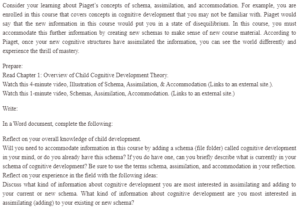Schemas, Assimilation and Accommodation
My current understanding of child development comes mostly from my personal experience as a parent and from what I have read. I understand that development occurs in stages with unique challenges and triumphs. I also know that children develop at different rates and that some may never reach their age group’s “expected” milestones. For instance, at three months, a child might not sit up independently, but they can already be babbling and showing much interest in the world around them (Rahmat et al., 2019). On the other hand, another child can be sitting up unassisted and starting to crawl by five months.
Do you need an original copy of “Schemas, Assimilation and Accommodation” ? Contact us.
I must add a schema for cognitive development as I am unfamiliar with many of the terms and concepts covered in this course. The file will accommodate new information, such as the stages of cognitive development, Piaget’s theory, and information processing (Lim & Barlas, 2019). Currently, my schema contains information on the developmental stages, milestones, and rate of development. Assimilation of this new information could be by adding it to my existing schema or by comparing and contrasting it with what I already know. For accommodation to occur, I may need to change my understanding of child development or create a new schema entirely. However, I am open to learning further information and excited to see how it can help my parenting journey.
I am most interested in assimilating information about child development stages and the rate of development. The rate of development is essential to me because I want to know if my children are developing “normally” and, if not, what I can do to help them. As children age, I am also interested in learning more about better supporting their cognitive development through activities and parenting techniques. The activities like reading, puzzles, and drawing can help a child’s cognitive development. I also want to know more about how different parenting techniques can impact cognitive development. For example, I have heard that using “time out” as a form of discipline can harm a child’s development.
References
Lim, C. R., & Barlas, J. (2019). The effects of toxic early childhood experiences on depression according to young schema model: a scoping review. Journal of Affective Disorders, 246, 1-13.
Rahmat, N. H., Othman, N. A., Muhammad, A. M., Anuarudin, A. A. S., & Arepin, M. (2019). Assimilation and accommodation: exploring the dynamics of class discussions. European Journal of Education Studies.
ORDER A PLAGIARISM-FREE PAPER HERE
We’ll write everything from scratch
Question
Consider your learning about Piaget’s concepts of schema, assimilation, and accommodation. For example, you are enrolled in this course that covers concepts in cognitive development that you may not be familiar with. Piaget would say that the new information in this course would put you in a state of disequilibrium. In this course, you must accommodate this further information by creating new schemas to make sense of new course material. According to Piaget, once your new cognitive structures have assimilated the information, you can see the world differently and experience the thrill of mastery.

Schemas, Assimilation, and Accommodation
Prepare:
Read Chapter 1: Overview of Child Cognitive Development Theory.
Watch this 4-minute video, Illustration of Schema, Assimilation, & Accommodation (Links to an external site.).
Watch this 1-minute video, Schemas, Assimilation, Accommodation. (Links to an external site.)
Write:
In a Word document, complete the following:
Reflect on your overall knowledge of child development.
Will you need to accommodate information in this course by adding a schema (file folder) called cognitive development in your mind, or do you already have this schema? If you do have one, can you briefly describe what is currently in your schema of cognitive development? Be sure to use the terms schema, assimilation, and accommodation in your reflection. Reflect on your experience in the field with the following ideas:
Discuss what kind of information about cognitive development you are most interested in assimilating and adding to your current or new schema. What kind of information about cognitive development are you most interested in assimilating (adding) to your existing or new schema?

